
THE VOICE OF INTERNATIONAL LITHUANIA
|
VilNews has its own Google archive! Type a word in the above search box to find any article.
You can also follow us on Facebook. We have two different pages. Click to open and join.
|
Author Archive
The Lithuanian people’s faces, their marketed goods and wares are so interesting to me
- Posted by - (0) Comment
![]()

This was a nice video you shared with us. It was like I took a mini trip from the comfort of my home. The Lituanian people's faces, their marketed goods and wares are so interesting to me. I can't make a trip to Lituania yet, but you never know in the future what may happen.
- Bookmark :
- Digg
- del.icio.us
- Stumbleupon
- Redit it
![]()

Thank you for sharing this! All the wonderful crafts, food, and beautiful people. Was a joy to watch.
- Bookmark :
- Digg
- del.icio.us
- Stumbleupon
- Redit it
What I love about some of the Lithuanian handicrafts is the sense of whimsy
- Posted by - (0) Comment
![]()

I just wish that I could be there, strolling down Pilies Gatve toward the Cathedral Square. What I love about some of the Lithuanian handicrafts is the sense of whimsy.
- Bookmark :
- Digg
- del.icio.us
- Stumbleupon
- Redit it
- Posted by - (0) Comment
16 February 1918:
INDEPENDENCE!

The original 20 members of the Council of Lithuania
after signing the Act of February 16, 1918
RESOLUTION
The Council of Lithuania in its session of February 16, 1918 decided unanimously to address the governments of Russia, Germany, and other states with the following declaration:
The Council of Lithuania, as the sole representative of the Lithuanian nation, based on the recognized right to national self-determination, and on the Vilnius Conference's resolution of September 18–23, 1917, proclaims the restoration of the independent state of Lithuania, founded on democratic principles, with Vilnius as its capital, and declares the termination of all state ties which formerly bound this State to other nations. The Council of Lithuania also declares that the foundation of the Lithuanian State and its relations with other countries will be finally determined by the Constituent Assembly, to be convoked as soon as possible, elected democratically by all its inhabitants.
- Bookmark :
- Digg
- del.icio.us
- Stumbleupon
- Redit it
- Posted by - (1) Comment
February 16, 1918
Act of independence

Facsimile of the Act of February 16
Dear readers,
Two of the most significant dates for Lithuania in the 20th Century were February 16, 1918 when Lithuania declared its independence from Imperial Russia by signing the Act of Independence of Lithuania and March 11, 1990 when the Act of the Re-Establishment of the State of Lithuania was signed which re-established the country’s freedom from Soviet Russia. We would like to share with you some of the situations that existed at this time and events that took place leading up to February 16, 1918 and the aftermath of this historical event.
Su pagarbe
Vincas Karnila
Associate editor
The Act of Independence of Lithuania (Lietuvos Nepriklausomybės Aktas) or Act of February 16 was signed by the Council of Lithuania on February 16, 1918, proclaiming the restoration of an independent State of Lithuania, governed by democratic principles, with Vilnius as its capital. The Act was signed by all twenty representatives, chaired by Jonas Basanavičius. The Act of February 16 was the end result of a series of resolutions on the issue, including one issued by the Vilnius Conference and the Act of January 8. The path to the Act was long and complex because the German Empire exerted pressure on the Council to form an alliance. The Council had to carefully maneuver between the Germans, whose troops were present in Lithuania, and the demands of the Lithuanian people.
The immediate effects of the announcement of Lithuania's re-establishment of independence were limited. Publication of the Act was prohibited by the German authorities so the text was distributed and printed illegally. The work of the Council was hindered since Germans remained in control over Lithuania. The situation changed only when Germany lost World War I in the fall of 1918. In November 1918 the first Cabinet of Lithuania was formed, and the Council of Lithuania gained control over the territory of Lithuania. Independent Lithuania, although it would soon be battling the Wars of Independence, became a reality.
While the Act's original document has been lost, its legacy continues as the legal basis for the existence of modern Lithuania, both during the interwar period and since 1990. The Act formulated the basic constitutional principles that were and still are followed by all Constitutions of Lithuania. The Act itself was a key element in the foundation of Lithuania's re-establishment of independence in 1990. Lithuania, breaking away from the Soviet Union, stressed that it was simply re-establishing the independent state that existed between the world wars and that the Act never lost its legal power.
Historic background and Council of Lithuania
After the last Partition of the Polish-Lithuanian Commonwealth in 1795, Lithuania was annexed by the Russian Empire. During the 19th century, both the Lithuanians and the Poles attempted to restore their independence. They rebelled during the November Uprising in 1830 and the January Uprising in 1863, but the first realistic opportunity came when both Russia and Germany were weakened during World W February 16, 1918.

The original 20 members of the Council of Lithuania after signing the Act of February 16, 1918
In 1915, Germany occupied western parts of the Russian Empire. After the Russian Revolution in 1917, Germany conceived the geopolitical strategy of Mitteleuropa which was a regional network of puppet states that would serve as a buffer zone and agreed to allow the Vilnius Conference, hoping that it would proclaim that the Lithuanian nation wanted to detach itself from Russia and establish a closer relationship with Germany.
However, their strategy backfired. The Vilnius Conference or Vilnius National Conference (Vilniaus konferencija) met between September 18, 1917 and September 22, 1917 and began the process of establishing a Lithuanian state based on ethnic identity and language that would be independent of the Russian Empire, Poland, and the German Empire. It elected a twenty member Council of Lithuania that was entrusted with the mission of declaring and re-establishing an independent Lithuania. The Conference, hoping to express the will of the Lithuanian people, gave legal authority to the Council and its decisions. The German authorities did not allow that resolution to be published, but they did permit the Council to proceed. While the Vilnius Conference laid the basic guiding principles of Lithuanian independence, it deferred any matters of political structure of the future Lithuania to the Constituent Assembly, which would later be elected in a democratic manner by means of a public vote.
PATH to the ACT of FEBRUARY 16
Act of December 11
The Act of December 11 was the second stage in the progression towards the final Act of Independence. The first draft, demanded by chancellor Georg von Hertling, was prepared by the German Ministry of Foreign Affairs on December 1. Further changes were jointly prepared by the German chancellery and by a delegation of the Council of Lithuania. The delegation's members were Antanas Smetona, Steponas Kairys, Vladas Mironas, Jurgis Šaulys, Petras Klimas and Aleksandras Stulginskis. After discussion amongst the parties, a compromise was reached on the document's text. The German representative, Kurt von Lersner, insisted that not one letter be changed in the agreed-upon text and that all the Council members sign the document.



Antanas Smetona Steponas Kairys Vladas Mironas



Jurgis Šaulys Petras Klimas Aleksandras Stulginskis
After the delegation returned to Vilnius, a session of the Council was held on December 11 in order to discuss the Act. It was adopted without any further changes. Fifteen voted in favor of the Act, three voted against it, one member abstained, and one did not participate. It is not entirely clear whether every member of the Council signed this document. The Act was written in German, and apparently no official Lithuanian translation was prepared. Therefore different sources provide slightly different translations. The Act of December 11 pronounced Lithuania's independence, but also asked German government for protection (clause 2) and called for "a firm and permanent alliance" with Germany. Since the Act specified that the alliance was to be formed based on conventions concerning military affairs, transportation, customs, and currency, many Lithuanians argued that the Council had overstepped its authority since the September resolution adopted by the Vilnius Conference clearly demanded that a constituent assembly decide these crucial matters of state.
Act of January 8
When peace talks started between Germany and Russia in 1918, German authorities asked the Lithuanian representatives to prepare two notifications of independence. One for Russia, in which Lithuania's ties with Russia would be denounced and nothing would be mentioned about an alliance with Germany and a second version to be released in Germany that would essentially repeat the Act of December 11. The Council decided to amend the first part of the Act of December 11. Petras Klimas included a sentence calling for the Constituent Assembly. Another important development was the statement that democratic principles would be the basis of the new state's governance, something that was declared by the Vilnius Conference, but omitted in the Act of December 11. The second part, mentioning the "firm and permanent alliance with Germany", was completely omitted. Its final version was approved on January 8, 1918, the same day that U.S. President Woodrow Wilson announced his Fourteen Points. In its essence, the Act of January 8 did not differ from the Act of February 16.

Jonas Basanavičius, the chairman of the Council when the Act of February 16 was signed
However, Ober Ost, the German military administration, rejected the changes. On January 26, in compliance with the earlier request, the two versions of the notification were approved, but they did not include the changes of January 8. The texts were prepared based on the Act of December 11. These concessions to the Germans created tensions among the Council members. Four members, Mykolas Biržiška, Steponas Kairys, Stanislaw Narutowicz and Jonas Vileišis, resigned from the Council in protest. The chairman of the Council, Antanas Smetona, who supported the Act of December 11, stepped down. Jonas Basanavičius, who would later be called the patriarch of independence, was elected as the chairman.
Act of February 16
Germany failed to recognize Lithuania as an independent state, and the Lithuanian delegation was not invited to the Brest-Litovsk negotiations that started on December 22, 1917 between the Central Powers (The Central Powers consisted of the German Empire, the Austro-Hungarian Empire, the Ottoman Empire, and the Kingdom of Bulgaria. The name "Central Powers" is derived from the location of these countries; all four were located between the Russian Empire in the east and France and the United Kingdom in the west) and Russia in order to settle territorial claims. During the first and final official joint session between the Council and the German authorities, it was made clear that the Council would serve only as an advisory board. This situation gave additional backing to those Council members who were seeking independence without any ties to other countries. The prime concern at this point was to invite back those members who had left the Council. Negotiations were undertaken that led to the reformulation of previous versions of the Act.

House of the Signatories at Pilies Street in Vilnius.
The four withdrawn members demanded that the Council return to the Act of January 8 and omit the mention of any alliance with Germany. After heated debates that lasted for several weeks, on February 15, at 10 am, the new revision of the Act was ready. It included, with minor stylistic changes, wording of the Act of January 8 and formal proclamation and notification, drafted on February 1. Formal proclamation and notification do not effect the legality of a document and do not change the meaning of a legal document. The Council, including the withdrawn members, was invited to return the next day for its finalization. On the next day, February 16, 1918, at 12:30 pm, all twenty Council members met in the room of Lithuanian Committee for Support of the War Victims, at 30 Didžioji Street (currently marked 26) in Vilnius. The building has since been known as the House of the Signatories (signatarų namai) and houses a museum. The Council first voted to approve the first part, the first two paragraphs up to the word drauge, of the Act. This section was approved unanimously. The second part, however, did not receive support from the four withdrawn members because they were not satisfied with the word "finally" in describing the duties of the Constituent Assembly (in "... the foundation of the Lithuanian State and its relations with other countries will be finally determined by the Constituent Assembly ..."). They were afraid that this word would give a pretext for the Council to usurp the powers of the Constituent Assembly, while the majority argued that the word simply expressed the non-negotiable and non-appealable nature of the future Assembly's decisions. Therefore the Act was unanimously approved but did not have full-fledged support from all twenty men.
Final text of the Act
Line 1
Original text – NUTARIMAS
English translation - RESOLUTION
Line 2
Lietuvos Taryba savo posėdyje vasario 16 d. 1918 m. vienu balsu nu-
The Council of Lithuania in its session of February 16, 1918 decided unanimously
Line 3
tarė kreiptis: į Rusijos, Vokietijos ir kitų valstybių vyriausybės šiuo
to address the governments of Russia, Germany, and other states with the following
Line 4
pareiškimu:
declaration:
Line 5
Lietuvos Taryba, kaipo vienintelė lietuvių tautos atstovybė, remdamos
The Council of Lithuania, as the sole representative of the Lithuanian nation, based on
Line 6
pripažintaja tautų apsisprendimo teise ir lietuvių Vilniaus konferencijos
the recognized right to national self-determination, and on the Vilnius Conference's
Line 7
nutarimu rugsėjo mėn. 18–23 d. 1917 metais, skelbia atstatanti nepriklau-
resolution of September 18–23, 1917, proclaims the restoration of the independent
Line 8
somą demokratiniais pamatais sutvarkytą Lietuvos valstybę su sostine
state of Lithuania, founded on democratic principles, with its captital
Line 9
Vilniuje ir tą valstybę atskirianti nuo visų valstybinių ryšių, kurie
in Vilnius and declares the termination of all state ties which formerly
Line 10
yra buvę su kitomis tautomis.
bound this State to other nations.
Line 11
Drauge Lietuvos Taryba pareiškia, kad Lietuvos valstybės pama-
The Council of Lithuania also declares that the foundation of the Lithuanian State and
Line 12
tus ir jos santykius su kitomis valstybėmis privalo galutinai nustatyti
its relations with other countries will be finally determined by the
Line 13
kiek galima graičiau sušauktas steigiamasis seimas, demokratiniu budu
Constituent Assembly, to be convoked as soon as possible, elected democratically
Line 14
visų jos gyventojų išrinktas.
by all its inhabitants.
Line 15
Lietuvos Taryba pranešdama apie tai .....................
The Council of Lithuania by informing the Government of ..................... to this effect
Line 16
vyriausybei, prašo pripažinti nepriklausomą Lietuvos valstybę.
requests the recognition of the Independent State of Lithuania.
Dr. Jonas Basanavičius
Saliamonas Banaitis
Mykolas Biržiška
Vilniuje, vasario 16 d. 1918 m. Kazys Bizauskas
In Vilnius, February 16, 1918
Pranas Dovydaitis
Jurgis Šaulys Steponas Kairys
Jokūbas Šernas Petras Klimas
Antanas Smetona Donatas Malinauskas
Jonas Smilgevičius Vladas Mironas
Justinas Staugaitis Stanisław Narutowicz
Aleksandras Stulginskis Alfonsas Petrulis
Jonas Vailokaitis Kazimieras Steponas Šaulys
Jonas Vileišis
AFTERMATH
Lithuania
Soon after the signing, the Act was taken to Germany and handed to parties in the German Parliament. On February 18, the text was reprinted in German newspapers, including Das Neue Litauen, Vossische Zeitung, Taegliche Rundschau and Kreuzzeitung. In Lithuania a text of the proclamation was prepared for printing in newspapers, particularly in Lietuvos Aidas, the Council's newspaper established by Antanas Smetona but the German authorities prohibited this publication. Although the majority of the copies of the issue were confiscated, the newspaper's editor, Petras Klimas, managed to hide about 60 of them. This censorship meant that Germany considered the distribution and dissemination of the Act as illegal in Lithuania.

The front page of Lietuvos Aidas with the text of the Act. The bulk of the issue was confiscated by German authorities.
On March 3, 1918, Germany and the now Bolshevik Russia signed the Treaty of Brest-Litovsk. It declared that the Baltic nations were in the German interest zone and that Russia renounced any claims to them. On March 23, Germany recognized independent Lithuania on the basis of the December 11 declaration. However, in substance, nothing had changed either in Lithuania or in the Council's status. Any efforts to establish an administration were hindered. This situation changed when the German Revolution started and Germany lost the war in the fall of 1918 and was no longer in a position to dictate terms. The Council of Lithuania adopted the first provisional constitution on November 2. The functions of government were entrusted to a three member presidium, and Augustinas Voldemaras was invited to form the first Cabinet of Ministers of Lithuania. The first government was formed on November 11, 1918, on the day that Germany signed the armistice in Compiègne. The Council immediately began to organize an army, police, municipalities, and other institutions. The proclaimed independence was established.
The Act
Two copies of the Act were signed, the original and a duplicate. The original was given to Jonas Basanavičius to safeguard and protect. The original was never published or used in any public matters; its existence was first mentioned in the press in 1933. The whereabouts of the original remain unknown. The duplicate was used in day-to-day business, and was stored in the president's archives until June 15, 1940, the day when Lithuania received an ultimatum from Soviet Russia and lost its independence. After that date the document disappeared. Neither the original nor the duplicate has been located. Historians and adventurers continue to hunt for it. In 2006, a team of engineers searched the walls of the former house of Petras Vileišis. Two facsimiles of the duplicate were produced, one in 1928 and the other in 1933. The 1928 facsimile is a closer reproduction of the Act in its original state; there are spelling errors, and the background is visually "noisy", while the 1933 facsimile shows the Act in an "improved" condition.
The Signatories
Most of the signatories of the Act remained active in the cultural and political life of independent Lithuania. Jonas Vileišis served in the Seimas/Parliament and as mayor of Kaunas, which was then the temporary capital of Lithuania due to Poland’s occupation of Vilnius. Saliamonas Banaitis was involved in finance, opening several banks. Among the signatories were two future Presidents of Lithuania, Antanas Smetona and Aleksandras Stulginskis. Jonas Basanavičius, chairman of the Council of Lithuania, returned to an academic life, pursuing his research in Lithuanian culture and folklore. Five signatories died before World War II started and three perished during the Nazi occupation. Those who did not emigrate to Western countries became political prisoners after Lithuania was occupied by the Soviet Russia.
Aleksandras Stulginskis and Petras Klimas were sent to prison in Siberia by Soviet authorities, but survived and returned to Lithuania. Pranas Dovydaitis and Vladas Mironas were also sent to Siberia but died there. Kazys Bizauskas disappeared during the summer of 1941 while being transported to a Soviet prison in Minsk. He is presumed to have been shot along with a number of other prisoners. Donatas Malinauskas was deported to Russia on June 14, 1941. Several of the signatories went into exile including Jurgis Šaulys and Kazimieras Steponas Šaulys, who died in Switzerland.
Antanas Smetona, Mykolas Biržiška and Steponas Kairys emigrated to the United States and are buried there.
Legacy
The Act of February 16 proclaimed the re-establishment (atstatyti) of the Lithuanian state, making it the successor to the Lithuanian historical state of the Grand Duchy of Lithuania. In this respect the Council deviated from the resolution adopted by the Vilnius Conference which called for establishment (sudaryti) of a Lithuanian state. However, it was made clear that the new state would be quite different from the old Duchy as it was to be organized only in ethnic Lithuanian lands and was to be governed by democratic principles as opposed to the multi-ethnic Duchy that had been ruled by aristocracy. The termination of the ties binding Lithuania to other states was addressed to Germany, Russia, and Poland, all of which had their own plans for the country. Even though not addressed directly, the Act renounced any attempt to resurrect the former Polish-Lithuanian union.
The Act of February 16, 1918, is the legal basis for the existence of present-day Lithuania, both during the interwar period and since 1990. The Act became one of the key elements during the restoration of Lithuania's independence from the Soviet Union in 1990. A paragraph in the Act of the Re-Establishment of the State of Lithuania, delivered on March 11, 1990, stated:
“The Act of Independence of 16 February 1918 of the Council of Lithuania and the Constituent Assembly (Seimas) decree of 15 May 1920 on the re-established democratic State of Lithuania never lost their legal effect and comprise the constitutional foundation of the State of Lithuania.”
This formulation emphasized the continuity of the two legal Acts. The Act of February 16, 1918 and its successor, the Act of March 11, 1990, are regarded as two of the most important developments of Lithuanian society in the 20th century.
February 16 in Lithuania is now an official holiday. On this day various ceremonies are hosted all across Lithuania, but the main commemoration is held in the House of Signatories in Vilnius where the Act was signed in 1918. During this observance the Flag of Lithuania is hoisted, and Lithuanian cultural activists and politicians deliver speeches from its balcony to the people gathered below. Special masses in churches and cathedrals are also delivered. Honoring the Act's legacy, the President of Lithuania hosts a reception for the signatories of the Act of March 11, 1990, in the Presidential Palace.

The House of the Signatories in Vilnius.
House of Signatories in Vilnius
In 1992, an award was established in honor of Jonas Basanavičius, who led the Council of Lithuania when the Act of February 16 was signed. The Jonas Basanavičius Prize is bestowed for distinguished work within the previous five years in the fields of ethnic and cultural studies. The prize is awarded in the House of Signatories, in homage to its history.
- Bookmark :
- Digg
- del.icio.us
- Stumbleupon
- Redit it
- Posted by - (0) Comment
Jonas Basanavičius
The patriarch of
Lithuania
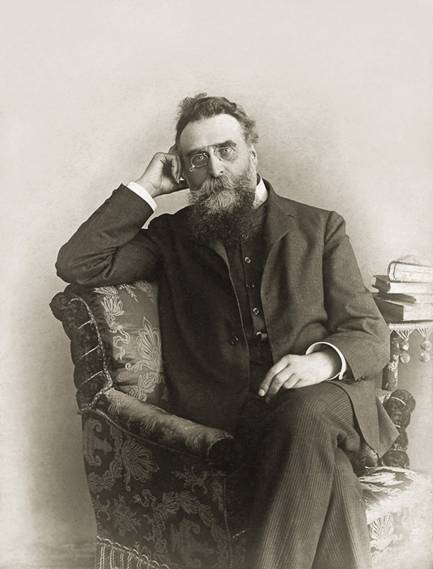
Jonas Basanavičius (23 November 1851 – 16 February 1927) was an activist and proponent of Lithuania's National Revival and founder of the first Lithuanian language newspaper Aušra. He was a signatory of the Act of Independence of Lithuania on 16 February 1918 Basanavičius is often given the unique informal honorific title of the "Patriarch of the Nation" for his contributions and help in re-establishing the Lithuanian state.
“A man's country is not a certain area of land, of mountains, rivers, and woods, but it is a principle; and patriotism is loyalty to that principle.”
- George William Curtis
It is 16 February 2013. It is today exactly 95 years since a group of brave men wrote the Lithuanian declaration of independence after the country had been under Tsarist Russia's iron heel through more than 100 years. These men represented a generation that certainly felt an overwhelming sense of pride at the dawn of renewed independence. The Act of February 16 was signed by all 20 representatives of the Council of Lithuania, proclaiming the restoration of an independent State of Lithuania, governed by democratic principles. The meeting and signing procedures were chaired by Jonas Basanavičius, the man often given the unique informal honorific title of the "Patriarch of the Nation" for his contributions and help in re-establishing the Lithuanian state.
What these men presented from the balcony of a house in Pilies street here in Vilnius Old Town was not much more than a piece of paper. But it was a paper that symbolized a nation willing to throw off the yoke.
A nation that had won back its self respect and dignity in spite of the injustice and oppression that had been going on since the Russian occupation started in 1795.
We salute these men for their courage and foresight. We salute them because they, in faith, hope and dignity clearly showed that Lithuania wanted to live up to its proud history as a nation of greatness.
Great nations are founded on self-belief!
- Bookmark :
- Digg
- del.icio.us
- Stumbleupon
- Redit it
- Posted by - (1) Comment
Jonas Basanavičius
The patriarch of Lithuania

Jonas Basanavičius (23 November 1851 – 16 February 1927) was an activist and proponent of Lithuania's National Revival and founder of the first Lithuanian language newspaper Aušra. He was a signatory of the Act of Independence of Lithuania on 16 February 1918 Basanavičius is often given the unique informal honorific title of the "Patriarch of the Nation" for his contributions and help in re-establishing the Lithuanian state.
By Aage Myhre, Editor-in-Chief
aage.myhre@VilNews.com
“A man's country is not a certain area of land, of mountains, rivers, and woods, but it is a principle; and patriotism is loyalty to that principle.”
- George William Curtis
It is 16 February 2013. It is today exactly 95 years since a group of brave men wrote the Lithuanian declaration of independence after the country had been under Tsarist Russia's iron heel through more than 100 years. These men represented a generation that certainly felt an overwhelming sense of pride at the dawn of renewed independence. The Act of February 16 was signed by all 20 representatives of the Council of Lithuania, proclaiming the restoration of an independent State of Lithuania, governed by democratic principles. The meeting and signing procedures were chaired by Jonas Basanavičius, the man often given the unique informal honorific title of the "Patriarch of the Nation" for his contributions and help in re-establishing the Lithuanian state.
What these men presented from the balcony of a house in Pilies street here in Vilnius Old Town was not much more than a piece of paper. But it was a paper that symbolized a nation willing to throw off the yoke.
A nation that had won back its self respect and dignity in spite of the injustice and oppression that had been going on since the Russian occupation started in 1795.
We salute these men for their courage and foresight. We salute them because they, in faith, hope and dignity clearly showed that Lithuania wanted to live up to its proud history as a nation of greatness.
Great nations are founded on self-belief!
As we now know, the newfound freedom was not going to last much more than 20 years. But they were 20 important years in which Lithuanians showed the world and themselves that the citizens and the country's leaders had the ability to collaborate an utterly successful reconstruction of the nation. Pride, dignity and courage came to characterize the inter-war years of this country.
The years 1988-1991 were also characterized by dignity and confidence. The quiet revolution that defined the Lithuanian and the other Baltic States' revolt against Soviet rule was almost like a textbook on how a nation's inner strength can lead to freedom originating from within, from its own citizens.
|
From Wikipedia Jonas Basanavičius was an activist and proponent of Lithuania's National Revival and founder of the first Lithuanian language newspaper Aušra. He was one of the initiators and the Chairman of the Organizing Committee of the 1905 Congress of Lithuanians, the Great Seimas of Vilnius. He was also the founder and chairman of the Lithuanian Scientific Society (1907). As a member of the Council of Lithuania, he was a signatory of the Act of Independence of Lithuania on February 16, 1918. Basanavičius is often given the unique informal honorific title of the "Patriarch of the Nation" (Lithuanian: tautos patriarchas) for his contributions and help in re-establishing the Lithuanian state. Basanavičius was born in the village of Ožkabaliai (Polish: Oszkobole) in Congress Poland, client state of the Russian Empire, to a family of Lithuanian farmers. Birth complications prompted his parents, devout Catholics, to pray and promise that they would educate their firstborn to be a priest. Keeping up with the promise, the parents supported a village tutor for local children. There Basanavičius learned basic reading, writing, and arithmetic as well as serving the altar. He further attended an elementary school in Lukšiai. During that time Polish was regarded as the more prestigious language of the nobility and well educated people. Russian was used in state administration, while Lithuanian was used among the peasants. After the Uprising of 1863, Tsarist authorities implemented various Russification policies in an attempt to reduce the influence of Polish language and culture. One of such policies allowed Basanavičius to attend Marijampolė Gymnasium. Before the uprising, a son of a Lithuanian could hardly expect to be admitted to a school catering to Polish nobility. Basanavičius failed his first entrance examinations in 1865, but succeeded a year later. Basanavičius developed appreciation for Lithuanian language, culture, and history from local hill forts and his parents, who provided a loving treasure of local songs, legends, stories. This appreciation grew and deepened at the gymnasium were Basanavičius got acquainted with classical authors of Lithuanian history (Maciej Stryjkowski, Alexander Guagnini, Jan Długosz, Marcin Kromer), studied Lithuanian folk songs, read classical poems The Seasons by Kristijonas Donelaitis, Konrad Wallenrod by Adam Mickiewicz, Margier by Władysław Syrokomla and historical fiction by Józef Ignacy Kraszewski. He drifted away from religion after reading criticism of Life of Jesus by Ernest Renan. Upon graduation in 1873, he managed to persuade his parents to allow him to attend Moscow University and not the Sejny Priest Seminary. Basanavičius traveled to Moscow first to study history and philology, but after two semesters he transferred to the Moscow Medical Academy. Again, he benefited from the post-uprising Russification policies. He received one of ten fellowships (360 rubles annually) established for Lithuanian students from Congress Poland. He also supplemented his income by taking up private tutoring, but the living conditions were harsh and that had a lasting impact on his health. Basanavičius actively participated in student affairs, followed developments in Lithuania, and continued his studies of Lithuanian heritage. Collecting data from Rumyantsev and university libraries, he hoped to write a study on Grand Duke Kęstutis. He usually spent his summers in Lithuania, collecting folk songs, fairytales, riddles. Medical career in Bulgaria
After graduation in spring 1879, Basanavičius made a trip back to Lithuania and had a few patients in Ožkabaliai, Vilkaviškis and Aleksotas. He returned to Moscow in October 1879 hoping to establish his private practice, but soon he accepted lucrative proposal from the Principality of Bulgaria to become the head of a hospital in Lom Palanka, a town of about 8,000 inhabitants. After arrival in late January 1880, he found a run-down hospital located in a former hotel and energetically took measures to construct a new building, establish outpatient service, and combat perception that the hospital was a place to die rather than to get well. In 1880, the hospital had 522 inpatients and 1144 outpatients compared to just 19 patients during 1879. The position paid well, expenses were low, so he was able to quickly repay debts and accumulate savings. Basanavičius also wrote medical research articles, liberal political articles supporting Petko Karavelov, and cultural articles for Prussian Lithuanian, including Tilžės Keleivis, Lietuwißka Ceitunga, Mitteilungen Der Litauischen Literarischen Gesellschaft. After assassination of Tsar Alexander II of Russia in March 1881, Bulgarian Prince Alexander of Battenberg attempted to crack down on liberal politicians. Afraid of persecution Basanavičius left Bulgaria in May 1882. He traveled for several months, visiting Belgrade, Vienna, Lithuania, before settling down in Prague in December 1882. There he organized publication of Aušra, the first Lithuanian-language newspaper. First issue appeared in March 1883 and marked a major milestone in the Lithuanian National Revival. Basanavičius directed the editorial policies, while Jurgis Mikšas handled printing in Ragnit in East Prussia. The newspaper then would be smuggled to Lithuania as publication in Lithuanian language was illegal in the Russian Empire. Basanavičius soon lost editorial control of Aušra to Jonas Šliūpas. In Prague Basanavičius met Gabriela Eleonora Mohl, a Bohemian German, and they married in May 1884. immediately after the wedding the couple moved to Bulgaria, where political situation had improved. Basanavičius first found a position in Elena, but managed to return to Lom Palanka in 1885. Life there was marked by a series of hardships. The Serbo-Bulgarian War brought a wave of war casualties to the hospital and a typhus epidemic. Basanavičius became seriously ill with pneumonia and typhus in February 1886. In August 1887, he survived an assassination attempt, but one bullet remained logged under his left shoulder blade for the rest of his life and caused various health issues. His attacker, Alexander Manoilov, served a ten-year sentence but never fully explained his reasoning. In February 1889, Mohl died of tuberculosis that she apparently contracted while still in Prague. The death of his wife sent Basanavičius into depression and melancholy for almost a year. In 1891 Basanavičius acquired Bulgarian citizenship and was promoted to Varna in 1892, but his health problems intensified. He suffered from arrhythmia, neurasthenia, neuralgia, paraesthesia. That prompted him to resign from public position in 1893 and limit his work to his private practice and palace visits to Ferdinand I of Bulgaria. Basanavičius traveled to Austria several times searching for cures to his ailments. In 1900 he suffered a stroke. In Varna, he joined the Democratic Party and was elected to the Varna City Council from 1899 to 1903. He also participated in the party congresses and helped develop party program in health care. Return to Lithuania In 1905, upon hearing that the Lithuanian press ban was lifted Basanavičius returned to Lithuania, and continued to play an important role in the Lithuanian national revival. He was the main force behind Great Seimas of Vilnius, that culminated with the Act of Independence of Lithuania in 1918. Dr. Basanavičius explored Lithuanian history, culture, folklore, ethnography and linguistics, writing more than forty works in these fields. He died in Vilnius on February 16, 1927, Lithuanian Independence Day, and was buried in Rasos Cemetery. |
- Bookmark :
- Digg
- del.icio.us
- Stumbleupon
- Redit it
- Posted by - (0) Comment
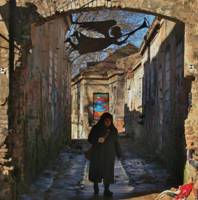
My Užupis love story (slide show with music). Click HERE to see it.
Užupis is the bohemian district of Vilnius city. The district is very popular with artists, and has been compared to Montmartre in Paris and to Freetown Christiania in Copenhagen, due to its never-mind atmosphere. On April 1, 1997, the district declared itself an independent republic (The Republic of Užupis).
__________________________

- Bookmark :
- Digg
- del.icio.us
- Stumbleupon
- Redit it
- Posted by - (0) Comment

Russian Ambassador:
Lithuania was incorporated into Soviet Union "rather peacefully"
Lithuania's incorporation into the Soviet Union happened rather peacefully, Russian Ambassador to Lithuania Vladimir Chkhikvadze said in Vilnius on Friday. The ambassador attended an event at the Ministry of Foreign Affairs held to introduce the second volume of "The Soviet Union and Lithuania during World War II," a collection of historic documents compiled by Lithuanian and Russian historians.
"The published archival materials undeniably show that Soviet Lithuania existed. By the way, it is noted in the introductory article, with references to archival materials, that Lithuania's incorporation into the internal system of the Soviet Union happened rather peacefully," the Russian diplomat said.
"The documents, in my opinion, have great importance for the description and evaluation of a period of common history that is difficult for us all. To my mind, it's very important also because efforts have recently been made in historical literature to falsify the truth, to diminish the role of the Soviet Union in victory against Fascism," Chkhikvadze said.
Read more...
- Bookmark :
- Digg
- del.icio.us
- Stumbleupon
- Redit it
- Posted by - (1) Comment
‘Lincoln’s’ grandfather
was a Lithuanian Jew

Daniel Day-Lewis has received widespread critical acclaim for his
performance in the movie Lincoln.
VilNews has previously written that Hollywood largely was created by Litvaks, the Lithuanian Jews who have had so endlessly huge influence on world culture, science, business and politics.
Go to our VilNews Section 12 for case examples.
Now it turns out that the star of this year's major film, Lincoln, also has Lithuanian ancestry. And not only that; his Lithuanian grandfather, Michael Balcon, had enormous influence on the British film industry in its startup phase in the early 20th century.
His mother, Jill Balcon, was a leading English film and radio actress.
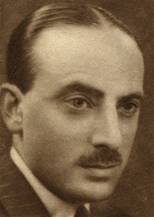 Sir Michael Balcon (1896 – 1977) grandfather. |
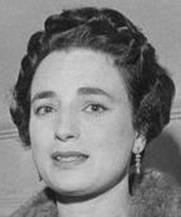 Jill Balcon (1925 – 2009) mother. |
About Sir Michael Balcon
Michael Balcon is considered one of the most important figures in British Cinema. It was his vision that brought international prestige to Gainsborough in the 20s and 30s. and he was a vigorous spokesman for the industry for most of his career.
Michael Balcon's career began in Birmingham in 1920, where, with Victor Saville he was a film distributor. Within two years they had begun producing feature films in London - Woman to Woman 1923 was the first. He formed Gainsborough Studios the following year. He visited the Ufa studios in Berlin in 1924 and began a co-production association with The Blackguard that was to last 10 years. German technical staff populated Gainsborough films through the 20s and early 30s giving them a slick, sophisticated veneer to match any film produced in Hollywood, Balcon was aiming for a product of international interest unlike many other British studios in the silent and early talkie era.
Read more: http://en.wikipedia.org/wiki/Michael_Balcon
About the movie “Lincoln”
Lincoln is a 2012 American historical drama film directed and produced by Steven Spielberg, starring Daniel Day-Lewis as United States President Abraham Lincoln and Sally Field as Mary Todd Lincoln. The film is based in part on Doris Kearns Goodwin's biography of Lincoln, Team of Rivals: The Political Genius of Abraham Lincoln, and covers the final four months of Lincoln's life, focusing on the President's efforts in January 1865 to have the Thirteenth Amendment to the United States Constitution passed by the United States House of Representatives. Lincoln premiered on October 8, 2012, at the New York Film Festival, and has since received widespread critical acclaim, with major praise directed to Day-Lewis' performance. In December 2012, the film was nominated for seven Golden Globe Awards including Best Picture (Drama), Best Director for Spielberg and winning Best Actor (Drama) for Day-Lewis. The film has been nominated for twelve Academy Awards, including Best Picture, Best Director for Spielberg and Best Actor for Day-Lewis.
- Bookmark :
- Digg
- del.icio.us
- Stumbleupon
- Redit it
- Posted by - (0) Comment
Clara Nathanson
I have a collection of works by Clara Nathanson. I was wondering if you could include them in your web site. Photographed by Brennan O'Brien.
Clara (Nathanson) Sachar was born 1/1/1887 in Lituva, Lithuania, and died 1/23/1968 in St. Louis, MO. She married Charles R. Sachar on 8/18/1914 in St. Louis ...
Patrick Weil Bertrand
- Bookmark :
- Digg
- del.icio.us
- Stumbleupon
- Redit it
- Posted by - (2) Comment
Clara Nathanson
I have a collection of works by Clara Nathanson. I was wondering if you could include them in your web site. Photographed by Brennan O'Brien.
Clara (Nathanson) Sachar was born 1/1/1887 in Lituva, Lithuania, and died 1/23/1968 in St. Louis, MO. She married Charles R. Sachar on 8/18/1914 in St. Louis ...
Patrick Weil Bertrand




- Bookmark :
- Digg
- del.icio.us
- Stumbleupon
- Redit it
- Posted by - (0) Comment
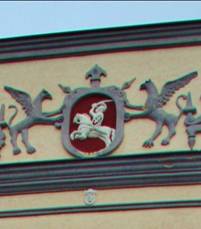
Welcome to
VilNews on
Facebook!
Possibly there are still some of our readers who do not know VilNews also has two active Facebook pages.
Click on the links at the top here on VilNews' frontage to access each of them.
One of these sites, "VilNews Notes & Photos" is for messages, photos and short stories of the more informal kind. Go there and click "like" to be kept up to date ...
The second, "VilNews Forum" is our very active debate forum where different topics are discussed, sometimes with high temperature ... To join the discussion, you must register as a participant (to be done at the very page) ...
- Bookmark :
- Digg
- del.icio.us
- Stumbleupon
- Redit it
- Posted by - (0) Comment
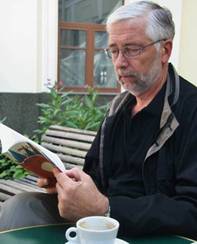
Novelist Antanas Sileika on the Traku - Pylimo street corner in Vilnius – with his book Underground.
Photo Aage Myhre
Why this perpetual
return to Lithuania?
Standing on the corner
of Traku and Pylimo
A writer muses about the foreign sources for his work and what it means to be a Canadian
By Antanas Sileika, novelist
For the fourth year in a row I’m standing at the crossroads of Pylimo and Traku Streets in Vilnius, Lithuania, worrying the place, trying to sift the stories that lie like dust between the cobblestones. I’m slightly sick of this baroque, labyrinthine city - the strangulated cries of the swallows at dusk make me think of the dead souls of forgotten citizens.
Read more…
- Bookmark :
- Digg
- del.icio.us
- Stumbleupon
- Redit it
- Posted by - (0) Comment
The essay gives an articulate voice to rather similar but jumbled thoughts rattling around and bothering me in my own head

Dear Tony,
Just a note to let you know how much I enjoyed the essay above. I feel bad it's been around since 2011 and I hadn't seen it. (Bankers don't read Queen's Quarterly, I guess. At least not this one!) Thanks to Aage for allowing it to appear here. The essay gives an articulate voice to rather similar but jumbled thoughts rattling around and bothering me in my own head. But that's what fine writers and storytellers are about after all. Thank you.
Rimantas Aukstuolis
- Bookmark :
- Digg
- del.icio.us
- Stumbleupon
- Redit it
VilNews e-magazine is published in Vilnius, Lithuania. Editor-in-Chief: Mr. Aage Myhre. Inquires to the editors: editor@VilNews.com.
Code of Ethics: See Section 2 – about VilNews. VilNews is not responsible for content on external links/web pages.
HOW TO ADVERTISE IN VILNEWS.
All content is copyrighted © 2011. UAB ‘VilNews’.

 Click on the buttons to open and read each of VilNews' 18 sub-sections
Click on the buttons to open and read each of VilNews' 18 sub-sections 





















.jpg)



